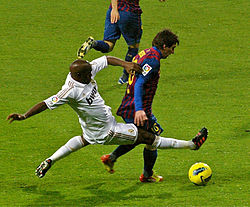Clubs and political identity
Some clubs have a fan base which is religious, right- or left-wing, nationalist, unionist, or autonomist.
England
Although many clubs do not have a fixed political identity, some clubs have clear leanings. According to YouGov statistics, supporters of Sunderland lean left [5] and often sing "The Red Flag" during marches. [6] [5] The hooligan firm Seaburn Casuals, on the other hand, is known for its far-right associations. When 26 Seaburn Casuals hooligans were arrested in a police raid before the 1998 FIFA World Cup, some were found to be involved with neo-Nazi groups such as Combat 18. [7] In contrast, according to YouGov statistics, supporters of Crystal Palace and West Ham lean right, with the latter being one of the most conservative clubs in the Premier League. [5]
Clubs such as Chelsea [8] and Millwall [9] are known to have many right-wing and far-right fans, and fans have chanted racist chants at games before. Despite Millwall having many right-wing fans, the club has a long-standing working-class culture, [10] however, working-class urban voters in the United Kingdom (along with several other countries) are traditionally left-leaning and tend to support social democracy and trade unionism.
Some non-league clubs have been adopted by fans that are vocally opposed to racism, homophobia and other forms of discrimination. Examples include Clapton [11] and Dulwich Hamlet. [12] [13] A breakaway from Clapton FC, named Clapton Community, have based their away shirt on the flag of the Spanish Second Republic, [14] [15] supported the October 2020 Polish protests, [16] [17] and reached out to refugees and LGBT people to feel welcome at football. [18]
Germany
Perhaps one of the most socially progressive football fans in the world are the fans of Hamburg-based club St. Pauli. Most St. Pauli supporters lean to the left of the political spectrum and describe themselves as anti-racist, anti-sexist, anti-fascist and pro-LGBT rights. [19] St. Pauli fans have been known for taking vocal, prominent stances on social and political issues that affect minorities, oppressed peoples, and the working class. Due to accusations of genocide of Palestinians, many St. Pauli supporters have openly stood in solidarity with Palestine, as well as condemn Israeli atrocities. Others have remained neutral (criticising Israel, Benjamin Netanyahu and Hamas), additionally few actively support Israel. [20]
In recent times, Bayern Munich fans have been described as left-leaning, while their Der Klassiker rivals Borussia Dortmund have historically been right-leaning. [21]
Non-league side Chemnitzer FC has an active right-wing and far-right supporter group, who are reportedly quite influential. In contrast, supporters of non-league side SV Babelsberg 03 are traditionally left-leaning. [21]
Indonesia
In Indonesia, one of the most successful clubs in Indonesian football Persipura Jayapura is considered to represent Papuan identity and it could be said to be one of the symbols of the campaign and struggle for Papuan separatism. [22] In several matches, the flag of the Republic of West Papua, which is considered separatist by the Indonesian government, was flown several times. [23] In fact, one of the players, Edward Junior Wilson, who comes from Liberia, was involved in a fight with the Indonesian police because he thought he was flying the West Papua flag. This happened in the deciding match 2016 Indonesia Soccer Championship A at Mandala Stadium, Jayapura on 18 December 2016. At that time, Persipura, who managed to become champion after beating PSM Makassar 4–2, celebrated their victory after the match. Edward also raised the national flag of Liberia, However, because it was raining at the time, the police mistook the flag he was flying and there was a flag-pulling action with him. After the incident, the police revealed the misunderstanding that had occurred. This incident also sparked a riot between fans and police at the stadium. [24]
For some Acehnese, Persiraja Banda Aceh is also considered to represent their Acehnese identity and the Free Aceh Movement. [25] In other cases, Persib Bandung is considered to represent the identity of Sundanese and West Java, especially the Priangan area and by some people it has been considered as their Sundanese culture. [26] By critical people, Persib is analogous to a symbol of resistance to Indonesian centrism which focuses on Jakarta (this is also related to its rivalry with Persija Jakarta). [27] [28] Persib is also considered "the national team of Bandung people", in fact the level of attendance at the stadium for Persib is higher than for the Indonesia national team when they play in Bandung. [29] [30] Low audience attendance for the Indonesian national team in Bandung this is also the background by sweeping actions and abuse carried out by rival supporters, The Jakmania against Bobotoh (the name for Persib supporters) when the Indonesian national team played in Jakarta, one of them was the attack on the capo of the Indonesian national team, who was also a Bobotoh on 28 October 2018 at Gelora Bung Karno Main Stadium by 30 to 50 The Jakmania members. [31] In 2022, a video showed the removal of a banner supporting the Indonesian national team at Sidolig Stadium in Bandung. In the video, the man who carried out the takedown said to the video viewer in Sundanese and English "Eweuh timnas, this is Persib!" ("There is no national team, this is Persib!"). This incident occurred during Indonesian national team training at the stadium. [32]
Israel
The Israeli club Beitar Jerusalem has far-right, fascist, Zionist and racist associations. Beitar fans have engaged in anti-Arab and anti-Muslim racist behavior. Fans have supported restricting Arabs and Muslims from joining the club. Arab and Muslim players from other clubs have often experienced racist and other offensive behavior. It remains the only Israeli Premier League club never to have had an Arab player (due to opposition by right-wing, racist fans). Some of Beitar's owners said they were ready to sign a worthy Arab player, but backed down when fans sent threats. [33] When two Russian Muslims were signed in 2013, Beitar fans violently rioted over the decision. Beitar's supporter group, La Familia, has been condemned for its further extremism. The controversial group has been penalized a number of times for anti-Arab chanting and slogans in and outside the stadium. La Familia has an extensive Mizrahi Jewish identity, and some right-wing Israeli politicians have aligned themselves with the group. The club has been condemned for not doing enough to address these issues. [34] [35] [36] Beitar's chief rival is Hapoel Tel Aviv, known for its left-wing leanings, and politics is the main impetus for their rivalry. Fans of the clubs often clash violently. [37] [33] [38] [39]
Italy
In Italy, the Derby della Capitale in Rome is often characterized by political tension. Some of Lazio's ultras used swastikas and fascist symbols on their banners, and they have engaged in racist behavior during the derbies. At a derby during the 1998–99 season, some Laziali unfurled a 50-meter banner which read, "Auschwitz is your town, the ovens are your houses". Black players from A.S. Roma have often experienced racist and other offensive behavior. [40] During the late 1970s, Lazio developed a strong rivalry with Pescara Calcio. [41] The far-right Lazio ultras consider A.S. Livorno Calcio and Atalanta, both with strong left-wing leanings, to be among their ideological antagonists. Livorno also clashes with opposing right-wing supporter groups, especially those of Inter Milan and Verona. [42] [43] Lazio player Paolo Di Canio and his Livorno counterpart, Cristiano Lucarelli, have given controversial, ideological salutes to fans during matches, with Di Canio giving a Roman salute and Lucarelli giving a raised fist.
Northern Ireland and Scotland
One of the largest and oldest football rivalries is the Old Firm Derby between the Scottish clubs Celtic and Rangers. The competition between the two clubs is rooted in more than a sporting rivalry; [44] it has as much to do with Northern Ireland as Scotland, as seen in the flags, cultural symbols, and emblems of both clubs. [45] It was infused with a series of complex disputes centred on religion (Catholic and Protestant), Northern Ireland-related politics (loyalism and republicanism), national identity (British or Irish-Scots), or social ideology (conservatism and socialism). [46] [47] Although most Rangers and Celtic supporters are not actively sectarian, serious incidents sometimes occur and the actions of a minority dominate the headlines. [48] [45] The Old Firm Derby fueled many assaults on Derby days, and some deaths have been directly related to the aftermath of Glasgow Derby matches. [49] An activist group which monitors sectarian activity in Glasgow has reported that on Glasgow Derby weekends, violent attacks increase nine-fold above normal levels. [50] An increase in domestic abuse can also be attributed to Glasgow Derby matches. [51]
Spain

Many of the Spanish football rivalries outside the local derbies involve politics (ideological or geographical). [52] The term morbo (roughly translating as morbid fascination and antagonism) [53] has been used [54] [55] to describe attitudes to the complex network of identities and relationships between Spanish clubs. [53] An informal system of alliances and enmities exists across the nation's hooligan groups, based on their political allegiance; [56] the most prominent may be between Atlético Madrid's right-wing followers and the left-wing group attached to Sevilla. [57] Sevilla is locally perceived as the middle-class club in the Seville derby, in contrast to working-class Real Betis. [58] The largest ultras groups who follow Real Madrid and Barcelona (the two clubs in Spain's most famous rivalry, El Clásico ) are right-wing. The hostility between them springs from their profiles as the symbolic representatives of Castile and Catalonia, [59] [60] which escalated under the Madrid-based ruling fascist regime of Francisco Franco during the mid-20th century and continued into the 21st, with many Barcelona supporters visibly sympathetic to the Catalan independence movement. As a result, the team is met with anger by other clubs' fans when they visit. [61] Barcelona's claimed position as the persecuted team in their relationship with Madrid contrasts with their city rivalry with Espanyol, who are aligned towards Spanish unionism and whose owners see Barça as the club unfairly favored by Catalonian lawmakers. [62] Real Madrid's rivalry with Athletic Bilbao, a team in the Basque region, involves differences in culture and ideology; its competitive element has diminished in an era of global exposure and recruitment, however, due to Athletic's policy of using local players to emphasize pride in their origins. [63] [64] [65]
